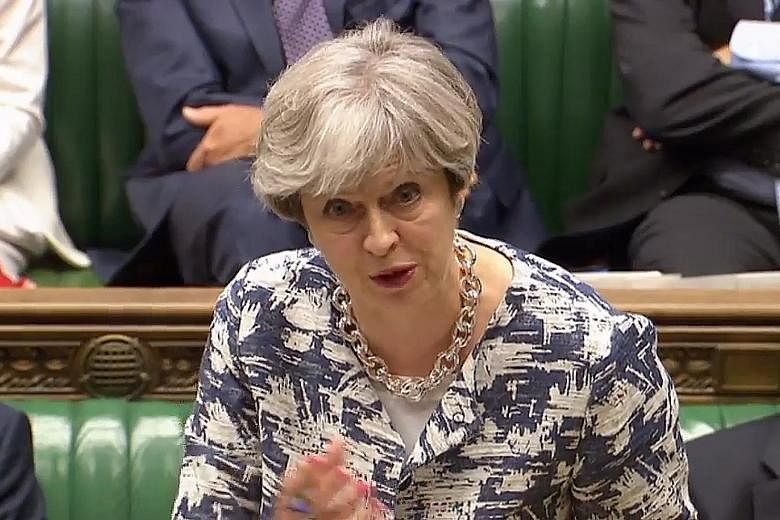LONDON • The European Union has demanded Britain go further to guarantee the rights of millions of EU citizens now residing in the country after Brexit, delivering a blow to British Prime Minister Theresa May's hopes for a swift deal.
The EU's chief Brexit negotiator Michel Barnier knocked back Mrs May's offer less than two hours after she set it out in a detailed 20-page report on Monday. The bloc's goal is for the "same level of protection as in EU law", said Mr Barnier. On Twitter, he said that "more ambition, clarity and guarantees" are needed.
Areas of disagreement include the ability of EU nationals in Britain to move family members to the UK after Brexit and the role of the European Court of Justice.
Both sides want an early settlement on citizens' rights before talking about a free trade accord between Britain and EU.
An estimated 3.2 million EU expatriates living in the UK would be treated as if they were British for the purposes of receiving state education, healthcare, benefits and pensions, Mrs May proposed.
The Prime Minister said she wants a reciprocal agreement to guarantee the rights of one million British citizens living in other EU countries.
"I want to completely reassure people that, under these plans, no EU citizen currently in the UK lawfully will be asked to leave at the point the UK leaves the EU - we want you to stay," Mrs May told lawmakers.
-
EU citizens' rights after Brexit
-
Britain has set out its offer to secure the rights of around 3.2 million European citizens living in the country after its exit from the European Union. Here are the main points in the proposal:
• Until Britain leaves the EU, EU citizens living in the United Kingdom will continue to enjoy the rights they have under EU treaties.
• Once Britain leaves the EU, it will create new rights in its law for qualifying EU citizens resident before the departure.
• Qualifying EU citizens will have to apply for residence status. The application process will be a separate legal scheme, under British law.
• Qualifying individuals will be granted "settled status", or indefinite leave to remain - free to reside in any capacity, to access public funds and services, and to apply for British citizenship.
• To qualify, an EU citizen must have been resident in the UK before a specified date and must have completed a period of five years of continuous residence before applying for settled status, at which point they must still be resident.
• EU citizens who became resident before the specified date but who have not accrued five years of continuous residence at the time of Britain's exit can apply for temporary status to remain resident until they have accumulated five years. After five years, they will be eligible to apply for settled status.
• EU citizens who arrived after the specified date will be allowed to remain in the UK for at least a temporary period and may become eligible to settle permanently.
• Family dependents who join a qualifying EU citizen in the UK before the exit will be able to apply for settled status after five years.
• Those joining after the exit will be subject to the same rules as those joining British citizens or alternatively to the post-exit immigration arrangements for EU citizens who arrive after the specified date.
REUTERS
The plan will allow EU nationals to send welfare payments to children living elsewhere and they will not have to prove they have comprehensive sickness insurance when seeking residency. It also offered unilateral guarantees on indexation of EU nationals' pensions.
The British proposal says the EU's top court, the Court of Justice of the European Union, would no longer have jurisdiction in the UK in cases involving EU citizens. This is problematic for the EU, because EU citizens in Britain, who now can appeal decisions of British courts to the European Court of Justice, would lose that right with Brexit.
Newspapers from Madrid, Spain, to Riga, Latvia, carried opinion pieces yesterday by UK Brexit Secretary David Davis, tailored for specific readerships.
"I've talked with ministers from many European countries in recent months, and it's been clear that guaranteeing the rights of citizens and giving them tranquillity is a priority for both sides," Mr Davis wrote in Spain's El Mundo, using words that were broadly repeated in columns across the continent.
"Myths concerning our approach aren't making the situation any easier - starting with suggestions that UK will take draconian steps to expel Poles after our exit from EU, or that we will come up with complicated procedures to discourage Poles from staying in our country," Mr Davis wrote in Poland's Gazeta Wyborcza newspaper.
BLOOMBERG, REUTERS

